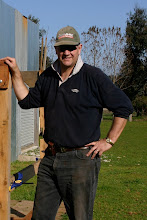I've been becoming more and more interested in complex systems theory. According to Wikipedia:
A complex system is any system featuring a large number of interacting components, whose aggregate activity is non-linear and typically exhibits self-organization under selective pressures.
It seems to me that both economies and farms are best understood as complex adaptive systems. I have always understood this on an intuitive, common sense level. Complex systems theory puts an intellectual framework around it.
One of my Dad's favourite aphorisms (perhaps just when he was arguing something with me) was 'beware of people who give simple answers to complicated questions'. I would like to think I've spent a good part of my life since I left the farm trying to avoid the tendency we all have to look for 'simple answers'.
I've recently come across someone who is is using complexity theory to explain the wet rice agriculture systems on the island of Bali. His name is Prof. Stephen Lansing - and he is very special!
I first found him via a podcast you can find on this page. The lecture was given in February 2006 - so it's well down the page. You can just search for Lansing or Bali.
From there, I found a book he has written called Perfect Order: Recognizing Complexity in Bali. So far I've only managed to read part of the first chapter on Amazon, but it's very good.
There is also an interview with him on YouTube called Cycle of Rice, Cycle of Life.
Another favourite author / thinker of mine is Nicholas Nassim Taleb. He is a trenchant critic of mainstream capital markets theory. His best book is The Black Swan. The following is a quote from his website:
What I do: I am interested in how to live in a world we don’t understand very well –in other words, while most human thought (particularly since the enlightenment) has focused us on how to turn knowledge into decisions, I am interested in how to turn lack of information, lack of understanding, and lack of “knowledge” into decisions –how not to be a “turkey”. My last book The Black Swan (and the 4th Quadrant papers) drew a map of what we don’t understand; my current work focuses on how to domesticate the unknown "what to do in a world we don't understand".
I find myself wondering what my own response to the challenges presented by Lansing and Taleb ought to be?




No comments:
Post a Comment